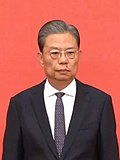| Years | Political Position | Military Position |
|---|
| 1983-85 | First secretary, Zhengding County, Hebei Province party committee | First political commissar and first secretary of the Party committee of People's Armed Forces Department of Zhengding County, Hebei Province |
| 1988-90 | Secretary of the CCP Ningde Prefectural Committee, Fujian Province | First secretary of the Party committee of Ningde Sub-Military Area Command |
| 1990-93 | Secretary of the CCP Fuzhou Municipal Committee and chairman of the Standing Committee of the Fuzhou Municipal People's Congress | First secretary of the Party committee of Fuzhou Sub-Military Area Command |
| 1995-96 | Deputy secretary of the CCP Fujian Provincial Committee, secretary of the CCP Fuzhou Municipal Committee and chairman of the Standing Committee of the Fuzhou Municipal People's Congress | First secretary of the Party committee of Fuzhou Sub-Military Area Command |
| 1996-99 | Deputy secretary of the CCP Fujian Provincial Committee | First political commissar of the anti-aircraft artillery reserve division of Fujian Provincial Military Area Command |
| 1999-2000 | Deputy secretary of the CCP Fujian Provincial Committee and acting governor of Fujian Province | Vice director of commission for national defense mobilization of Nanjing Military Area Command, director of Fujian provincial commission for national defense mobilization, first political commissar of antiaircraft artillery reserve division of Fujian Provincial Military Area Command |
| 2000-02 | Deputy secretary of the CCP Fujian Provincial Committee and governor of Fujian Province | Vice director of commission for national defense mobilization of Nanjing Military Area Command, director of Fujian provincial commission for national defense mobilization, first political commissar of antiaircraft artillery reserve division of Fujian Provincial Military Area Command |
| 2002 | Deputy secretary of the CCP Zhejiang Provincial Committee and acting governor of Zhejiang Province | Vice director of commission for national defense mobilization of Nanjing Military Area Command, director of Zhejiang provincial commission for national defense mobilization |
| 2002-03 | Secretary of the CCP Zhejiang Provincial Committee and acting governor of Zhejiang Province | First secretary of the Party committee of Zhejiang Provincial Military Area Command, vice director of commission for national defense mobilization of Nanjing Military Area Command, director of Zhejiang provincial commission for national defense mobilization |
| 2003-07 | Secretary of the CCP Zhejiang Provincial Committee and chairman of the Standing Committee of the Zhejiang Provincial People's Congress | First secretary of the Party committee of Zhejiang Provincial Military Area Command |
| 2007 | Secretary of the CCP Shanghai Municipal Committee | First secretary of the Party committee of Shanghai Garrison |







